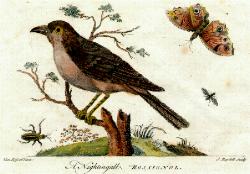
William Shakespeare – Sonnet 102
My love is strengthened, though more weak in seeming;
I love not less, though less the show appear;
That love is merchandized, whose rich esteeming,
The owner’s tongue doth publish every where.
Our love was new, and then but in the spring,
When I was wont to greet it with my lays;
As Philomel in summer’s front doth sing,
And stops his pipe in growth of riper days:
Not that the summer is less pleasant now
Than when her mournful hymns did hush the night,
But that wild music burthens every bough,
And sweets grown common lose their dear delight.
Therefore like her, I sometime hold my tongue:
Because I would not dull you with my song.
The poet continues to excuse his recent silence by saying that it is a sign of his increased love. Even the nightingale’s song would become tedious if it were spread throughout the entire summer, when every other common bird was singing. It is noticeable in this sonnet that the imagery almost takes command, and what in the beginning started as praise of the youth becomes a separate delight in the manifestations of early summer, as the days ripen, and birds sing from every tree. Finally the poet puts an end to it all, and insists that silence is best, since the beauty of their love does not need a prattling tongue to enliven it with song.
The sonnet is part of the group of four which run from 100 to 103, and is a variation on the theme of silence which they seek to explain and excuse.
The 1609 Quarto Version
MY loue is ſtrengthned though more weake in ſee-
I loue not leſſe,thogh leſſe the ſhow appeare, (ming
That loue is marchandiz’d,whoſe ritch eſteeming,
The owners tongue doth publiſh euery where.
Our loue was new,and then but in the ſpring,
When I was wont to greet it with my laies,
As Philomell in ſummers front doth ſinge,
And ſtops his pipe in growth of riper daies:
Not that the ſummer is leſſe pleaſant now
Than when her mournefull himns did huſh the night,
But that wild muſick burthens euery bow,
And ſweets growne common looſe their deare delight,
Therefore like her, I ſome-time hold my tongue:
Becauſe I would not dull you with my ſonge.
Commentary
1. My love is strengthened, though more weak in seeming;My love = my affection for you. However, it could mean ‘you, the beloved, you, whom I love’, and could include a suggestion of deterioration in the appearance of the youth. The words seeming, and show are echoes of the concluding line of the previous sonnet. They usally carry overtones of hypocrisy and false covering for something which is not all well within. Here however the opposite is the case, or so the poet declares, in that his love shows itself as weak, and seems to be less than before, but in reality it has become stronger. Whether one believes this declaration or not is perhaps not relevant. Within the conventions of sonneteering the lover’s words are gospel and the beloved is faultless. But the mere fact that the protestations occur as justifications for a period of silence, and that they are set in a group of sonnets which follow on from some in which abandonment, (87-9), hatred (90), deception (94-6) and separation (97-8) are the themes, leads one to suspect that the protestations themselves are mere show, a failing or tired love which is covered over with elegant and skillful wordplay.2. I love not less, though less the show appear;See the note above. The poet claims that the ostentatious show of his love, which in former times was evidenced by frequent sonnets (and other declarations?), he now considers to be superfluous, and he does not wish to cheapen his love by making it too public and shallow.3. That love is merchandized, whose rich esteeming,That love = any love (which is advertised, publicised, put up for sale by the owner);
is merchandized = is made into a commodity, is reduced to the level of an object of trade (or prostitution).
whose rich esteeming = the precious worth of which.
3-4: ‘Any love, when its preciousness is broadcast to the world as if it were a piece of merchandise, has its value reduced to that of a mere commodity on the market place’.4. The owner’s tongue doth publish every where.
Bawd Boult, take you the marks of her, the colour of her
hair, complexion, height, age, with warrant of her
virginity; and cry ‘He that will give most shall
have her first.’ Such a maidenhead were no cheap
thing, if men were as they have been. Get this done
as I command you.
Boult Performance shall follow.
[Exit]………………………..
Marina The gods defend me!
Bawd If it please the gods to defend you by men, then men
must comfort you, men must feed you, men must stir
you up. Boult’s returned.
[Re-enter Boult]
Now, sir, hast thou cried her through the market?
Boult I have cried her almost to the number of her hairs;
I have drawn her picture with my voice.
Bawd And I prithee tell me, how dost thou find the
inclination of the people, especially of the younger sort?
Boult ‘Faith, they listened to me as they would have
hearkened to their father’s testament. There was a
Spaniard’s mouth so watered, that he went to bed to
her very description.
Bawd We shall have him here to-morrow with his best ruff on.
Boult To-night, to-night. Per.IV.2.56-1055. Our love was new, and then but in the spring,Springtime and love were proverbial companions. Cf. the song in As You Like It:
It was a lover and his lass,
With a hey, and a ho, and a hey nonino,
That o’er the green corn-field did pass
In the spring time, the only pretty ring time,
When birds do sing, hey ding a ding, ding:
Sweet lovers love the spring. AYL.V.3.14-19.
It is not implied that the poet first became acquainted with the youth in the springtime.6. When I was wont to greet it with my lays;I was wont = I was in the habit of, I was accustomed to.
greet it = welcome it, celebrate it, salute it.
lays = songs, poems. See the notes on the following:
Yet nor the lays of birds 98.5
Sing to the ear that doth thy lays esteem 100.77. As Philomel in summer’s front doth sing,
summer’s front = the beginning of the summer, early summer.
front also meant forehead. Compare this from Coriolanus:
one that converses more with the buttock of the night than with the forehead of the morning: COR.II.1.
The nightingale sings most in early summer, when seeking a mate.
The tunes of the nightingale are stale in the middle of summer, because we hear them at the coming in of the spring.
The Great Frost of Jan 1608. Reprinted in E. Arber, An English Garner, 1877, Vol 1, p.88.8. And stops his pipe in growth of riper days:stops his pipe = ceases to sing. The pipe was the traditional shepherd’s instrument, so any music of the countryside could be referred to in such terms, since the natural music of the fields was regarded as the source of all melodies. We tend to underestimate how close the Elizabethan age was to all the sounds of nature. Even in London, which was then a large city, fields and gardens were always close by. Roads were not tarmacked and concrete was almost unknown. (OED.3.a. gives the earliest use of the word concrete in this sense as 1834, although concrete of some sort was in fact used by the Romans). One would not have to leave the city to hear a nightingale sing. For us such sounds are obscured, masked and obliterated by city living. See for example Bottom’s speech in Midsummer Nights Dream:
BOT. I will walk up and down here, and I will sing, that they shall hear I am not afraid.
[Sings]The ousel cock so black of hue,
With orange-tawny bill,
The throstle with his note so true,
The wren with little quill,– etc. MND.III.1.113-7
Bottom automatically finds his security in the rural memory of birds and bird song.
his – editors often emend this to her, in conformity with lines 10 & 13. Arguments in favour of retaining his are given by GBE p.211, and JK p.306. (among others).
riper days = days of ripeness and plenty, as the summer advances into autumn.9. Not that the summer is less pleasant nowNot that = it is not because etc. I.e. I have not ceased writing sonnets to you because the summer of our love is less pleasurable than the springtime was, when the nightingale etc..10. Than when her mournful hymns did hush the night,her – through the influence of the legend the singing nightingale was thought of as female. It may not have been known at the time that it was the male which was the chief songster.
mournful hymns – sad tunes, (because of Philomela’s tragic story). Bird song at night however would be considered mournful, in harmony with the darkness of night.
hush the night – the night appeared to become hushed as if listening to the song of the nightingale. This is a frequent experience, even today, of those who actually do listen to a nightingale singing.11. But that wild music burthens every bough,
wild = savage, uncultured. In contrast to the measured chants of the nightingale the undisciplined songs of other birds were wild and savage. Note however that wild and vile (vild) were interchangeable words of unfixed spelling (See OED wild, a.4-6). Hence wild could here be tinged with the meanings of vile – ‘base, vulgar, commonplace, despicable’. burthens every bough = makes every bough heavy. The imagery tends to make one think of birds sitting on boughs and singing. Every bough is crammed full with tedious birds in full song, birds more common than the nightingale. burthen, which is an old spelling of burden, also had the meaning of ‘chorus, refrain’. (OED.10.) This adds an additional richness to the line. Cf. Ariel’s song in The Tempest:
Come unto these yellow sands,
And then take hands:
Courtsied when you have and kiss’d
The wild waves whist,
Foot it featly here and there;
And, sweet sprites, the burthen bear.
Hark, hark!
[Burthen, dispersedly, within] Bow-wow
The watch-dogs bark!
[Burthen] Bow-wow… Tem.I.2.375-383.
There may also be a reference to the rival poets, who ‘burthen every bough’ with their commonplace praises of the youth.12. And sweets grown common lose their dear delight.sweets grown common = sweet things that have become common place, vulgar, widespread.
dear delight = precious and valuable ability to give pleasure. The thought is almost proverbial, although recorded proverbs do not match these words. The rarity of a thing often makes it precious13. Therefore like her, I sometime hold my tongue:like her = like the nightingale;
sometime = at times, for some periods of time.
hold my tongue = refrain from writing verse in praise of you, or praising you in speech.14. Because I would not dull you with my song.
I would not = I prefer not to, I choose not to;
dull you = bore you, make you endure the tedium of my song. Also, make you lose your shine by using repetitious praise. The poet wishes to avoid the fault of over-praising the youth, which would have the effect of making all praise vulgar, dull, and as common as birdsong.







